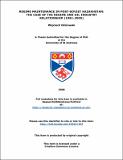Regime maintenance in post-Soviet Kazakhstan: the case of the regime and oil industry relationship (1991-2005)
Abstract
The main aim of this thesis is to investigate the ways in which the authoritarian regime in post-Soviet Kazakhstan maintained itself in power from 1991 until 2005. This study endeavours to uncover the palette of the regime’s methods by analysing the ways in which it went about controlling the oil industry – an industry with which the political and economical future of Kazakhstan is inseparably intertwined. The empirical section of this study investigates the interplay between the regime and the actors located in and around two cores: the National Oil Company and the oil-rich areas. This thesis focuses in particular on instances where players involved with the oil industry, whether directly or indirectly, attempted to challenge the regime’s authority in those two centres either due to greed or grievances. It is argued that these moments of crisis reveal the regime’s maintenance techniques, and can precipitate the deployment of new methods of maintenance in response to them. In order to account for the techniques that the Kazakh ruling regime applied in structuring its relationships with the oil industry, this thesis shifts the emphasis from the prevalent zhuz-horde, tribe, and clan-based approaches to Kazakh politics towards formal (corporatism) and informal (patron-client) mechanisms of control.
Type
Thesis, PhD Doctor of Philosophy
Rights
Creative Commons Attribution-NonCommercial-NoDerivs 3.0 Unported
http://creativecommons.org/licenses/by-nc-nd/3.0/
Collections
Except where otherwise noted within the work, this item's licence for re-use is described as Creative Commons Attribution-NonCommercial-NoDerivs 3.0 Unported
Items in the St Andrews Research Repository are protected by copyright, with all rights reserved, unless otherwise indicated.


